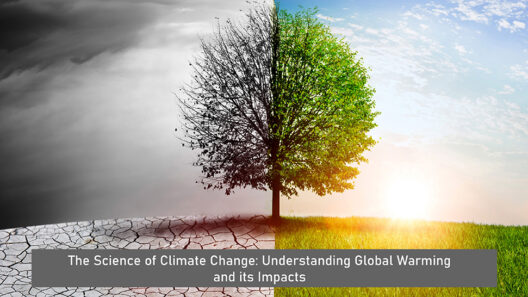The intricate interplay between economic policies and the burgeoning crisis of global warming is a salient topic that merits rigorous examination. From boardrooms to budgets, the ramifications of climate change are becoming increasingly evident, pressuring corporate leaders, policymakers, and stakeholders to recalibrate their priorities. Understanding how global warming intersectingly shapes economic agendas requires a multifaceted approach, acknowledging that these issues are not merely circumstantial but rather symptomatic of deeper systemic challenges.
At the heart of this dialogue is the acknowledgment that climate change transcends environmental concerns and penetrates deeply into economic territories. Traditional economic models often fail to account for the externalities associated with environmental degradation — a miscalculation that reveals itself through escalating natural disasters, food scarcity, and health crises. Such events not only wreak havoc on ecosystems but also exert pronounced stress on national budgets, compelling governments to allocate resources towards disaster relief and recovery. As a result, the global economy faces volatility hastened by climate-induced impacts, reverberating through markets and investment strategies.
In boardrooms across the globe, business leaders are increasingly attuned to these realities. The once-niche discussions surrounding corporate sustainability have burgeoned into strategic imperatives. Investors now scrutinize Environmental, Social, and Governance (ESG) criteria with a fervor previously reserved for financial metrics. The rationale is straightforward: companies that disregard environmental stewardship jeopardize their long-term viability. Major corporations, recognizing the potential for reputational damage, are pivoting towards sustainable practices. This transformation reflects a conscientious endeavor to mitigate risks associated with climate change, thereby aligning corporate strategies with broader societal expectations.
Furthermore, the integration of climate considerations into economic policy frameworks has become indispensable for governments. The recent surge in climate activism has galvanized public sentiment, pressuring political entities to take decisive action against climate change. National budgets are increasingly reflecting this paradigm shift, with allocations directed towards renewable energy investments, infrastructure adaptation, and climate resilience initiatives. The promulgation of green energy policies illustrates a growing consensus that sustainability should underpin economic recovery and growth strategies, especially in a post-pandemic world.
Nevertheless, the transition to greener economies is fraught with complexities. For one, the dichotomy between economic growth and environmental preservation poses a formidable challenge. Governments grapple with the necessity of generating employment and stimulating economic activity while concurrently pursuing carbon neutrality. This tension often leads to contentious debates within legislative bodies, where the interests of traditional energy sectors clash with burgeoning renewable industries. Consequently, policymakers must engage in sophisticated deliberations, weighing the immediate economic benefits of fossil fuels against the catastrophic long-term implications of climate inaction.
Another critical aspect is the emerging concept of climate finance, which essentially serves as a mechanism for funneling investments into climate-resilient projects. Developed nations have pledged support to developing countries to foster sustainable growth and mitigate climate risks. This financial apparatus is pivotal for facilitating the transition from reliance on fossil fuels to more sustainable energy sources. However, the efficacy of climate finance hinges on transparency and accountability — without these, the risk of misallocation looms large, potentially undermining the very initiatives designed to combat climate change.
The corporate sector plays a critical role in this transformation. Businesses that incorporate sustainability into their value propositions are not only positions themselves to stave off regulatory and reputational risks but also open pathways to innovation. Circular economies, for instance, are reshaping how products are created and consumed. By emphasizing resource efficiency and waste reduction, companies can harness economic growth while minimizing their ecological footprints. This holistic approach is indicative of a paradigm more aligned with the tenets of eco-capitalism — an economic model that prioritizes planetary health alongside profit.
Emerging technologies are also at the forefront of this dialogue. The advent of artificial intelligence, blockchain, and other such innovations stands to revolutionize how industries operate, particularly in resource management and emissions tracking. By leveraging technology, companies can enhance operational efficiencies and foster greater accountability in their supply chains. The economic agendas crafted in this context will inevitably reflect an understanding of the intricate link between technological advancement and environmental stewardship.
Moving towards the future, it is imperative that global economic agendas become increasingly cognizant of climate dynamics. The pursuit of sustainable growth mandates a recalibration of both corporate strategies and public policies. It is essential to foster collaboration between the private sector, government entities, and civil society to ensure an integrated approach to climate action. Educational initiatives should also be emphasized, espousing a culture of sustainability embedded in the very fabric of economic discourse.
Moreover, the inertia surrounding climate policy necessitates robust advocacy and grassroots mobilization. Environmentalist movements have played a pivotal role in catalyzing change, revealing an undeniable truth: economic agendas must evolve in tandem with the pressing realities of global warming. The fusion of economic imperatives with ecological integrity is not merely an aspirational objective; it is a requisite for survival in an increasingly unpredictable world.
In summation, the nexus between global warming and economic agendas is complex and multifaceted. From boardrooms to budgets, the intrinsic challenges presented by climate change demand innovative thinking and collaborative action. As stakeholders navigate these turbulent waters, a commitment to sustainability will be the linchpin that determines our collective future. By reframing economic priorities with an eye towards environmental stewardship, it is possible to create a resilient economy capable of weathering the storms of climate change.








